-
Feed Chickens This for Super Healthy Eggs!
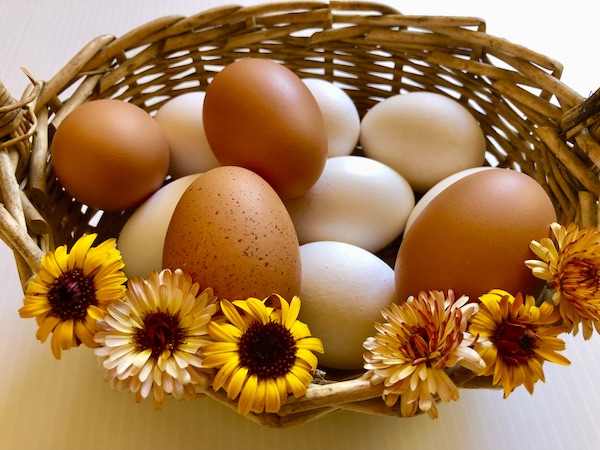
I was recently reading a story about a local couple here in California who are selling their designer eggs to upscale restaurants for $20.00 a dozen. Apparently they feed their chickens superfoods such as acerola cherry and camu camu powders (I had to look these up!) and give them coconut water to drink. While I am in awe that someone would go to such lengths to have healthy chickens and eggs, the truth is, it simply isn’t necessary. You don’t need fancy products to get healthy eggs. Here’s what to feed your chickens to ensure their eggs are as healthy as possible.
Free Range Them
The number one thing you can do to promote healthy egg laying is free range your chickens, which allows them to forage for insects, grains, and grasses. Chickens are natural foragers. But if you simply can’t due to the threat of predators, etc. here’s what you should feed your chickens.
Fresh Water
Access to fresh clean water is the number one thing chickens need to produce healthy eggs. Did you now that an egg is actually half water? Water is incredibly important or your chickens will become dehydrated and your egg production will plummet.
Protein
Insects are high in protein and your chickens will go gaga over them. You can give them worms or bugs from your garden or purchase mealy worms or crickets for them. Mine just loved the grubs I found when splitting wood from a dead tree on the farm. You can also give them cooked eggs, never raw. My chickens love both boiled and scrambled eggs. I also grow wheatgrass from seed as this has a high protein content and my chickens find it very tasty. Grass hay mixed with alfalfa, something I give my goats, I also give my chickens as it adds needed protein for healthy eggs.
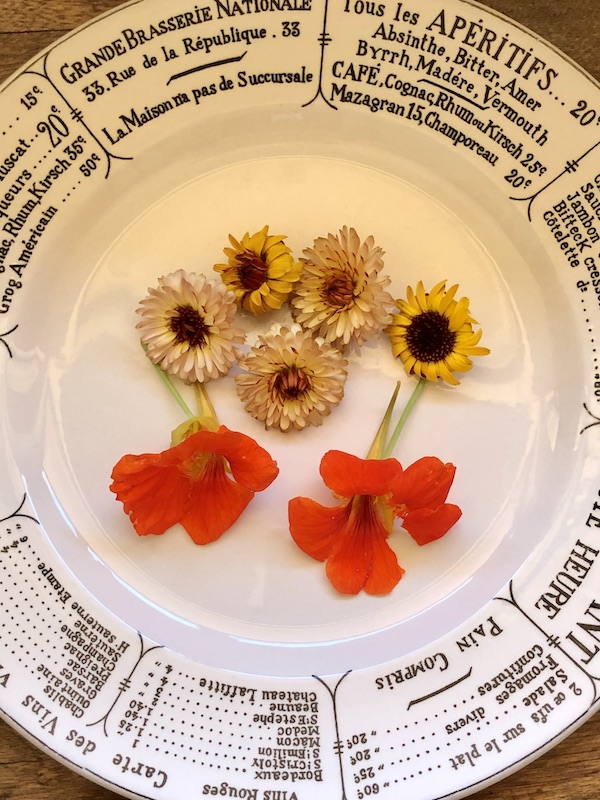
Flowers, Herbs & Vegetables
I give my chickens greens from my garden daily, including spinach, Swiss chard and lettuce. Other vegetables they love include tomatoes, pumpkin, and broccoli. (Do NOT give them avocados as they contain a component known as persin, which is lethal to chickens). In the spring, I forage my farm for wild miner’s lettuce and dandelion greens which they absolutely love to eat. Herbs are also provided from time to time, including basil, mint and oregano. Flowers such as nasturtium, calendula are also good for healthy eggs. Did you know that oregano can help prevent disease in chickens? Studies show that using oregano as well as garlic can help eliminate the need for artificial antibiotics. But if giving chickens garlic, be aware that it can affect the taste of your eggs.
Grains
I only feed my chickens organic chicken feed that has good nutritional value. Other grains you can provide include oats, barley, millet, flax, rye, and sunflower seeds. If you soak the seeds for 1-4 days they will ferment and this will add probiotics to help protect against harmful bacteria such as salmonella and E-coli. I also give my chickens foraged wild grasses which they enjoy scratching and pecking at to get the grain.
Fruits
Healthy fruits for chickens include watermelon, cantelope, cherries, berries and the like.
Calcium
Calcium is necessary to keep both the chickens and the eggs healthy. If you don’t feed them enough calcium, you will notice that the shells on your eggs are thin and flimsy. This can lead to breakage. I prefer to give my chickens oyster shells which you can purchase at most feed stores or online. You can also give them ground up eggshells, but I don’t recommend this as it could lead to the chickens pecking at their own eggs if they are looking for more calcium. A chance not worth taking, because eating their own eggs is a very hard habit to get rid of.
Providing your chickens with a healthy and varied diet will provide you with the healthiest eggs ever. Try to avoid giving them table scraps or foods with little nutritional value. And never give them food that is rotting or spoiled. To find out more about what not to feed your chickens, see 15 Things You Should Avoid Feeding Your Chickens.
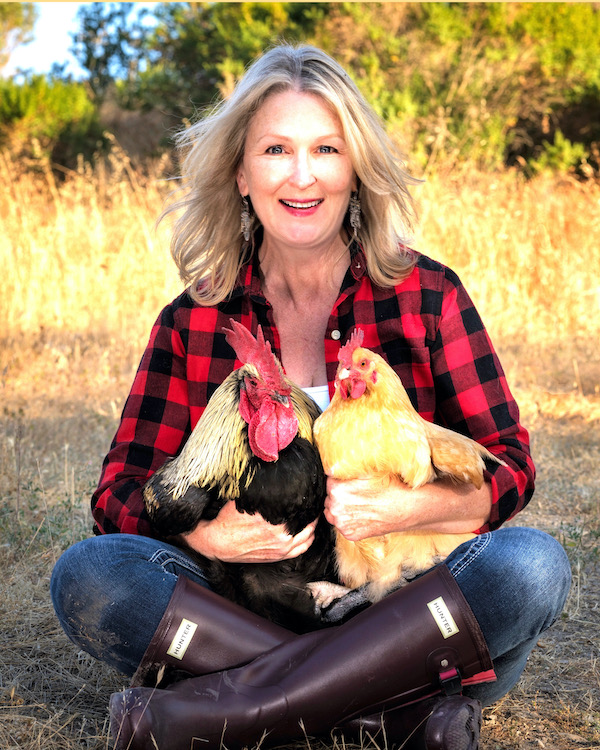
Thank you for visiting my blog! Wishing you peace, love, happiness, and healthy chickens and eggs.
-
The Real Truth About Eggs
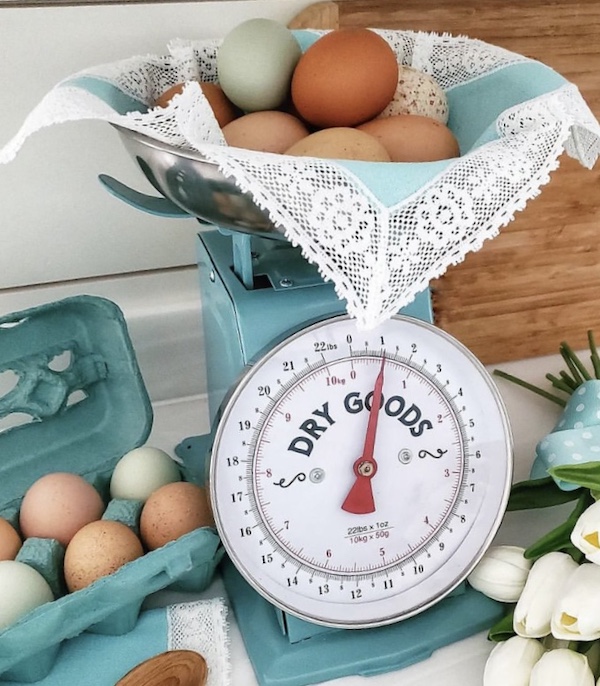
One of my favorite things about living on a farm is having a huge chicken coop full of feathered friends. I love heading up to the coop each day to retrieve my bounty of freshly laid eggs. I also love sharing them with my neighbors and friends. Having raised chickens for several years now, I tend to be asked the same questions over and over. There are many fallacies floating around out there. Just to set everyone straight, here is the real truth about eggs.
1. Don’t you need a rooster for your chickens to lay eggs?
Truth: No! You do not need a rooster. Hens lay eggs with or without a rooster. The only reason you would need a rooster is if you wanted to have baby chicks.
2. Do eggs need to be refrigerated immediately after being laid?
Truth: No, they do not. Eggs are naturally created with a bloom. The bloom is a protective layer that seals the egg and prevents bacteria from getting inside. The bloom also helps prevent moisture from escaping. Fresh eggs can be kept unrefrigerated for up to two to four weeks. Isn’t nature amazing? Washing an egg destroys the protective bloom, and that is why the eggs you buy at the store have to be refrigerated right away. They have been washed with chemicals and coated with oil. The government requires this to prevent prevent potential food poisoning from salmonella, which is more likely to occur at huge egg production facilities.
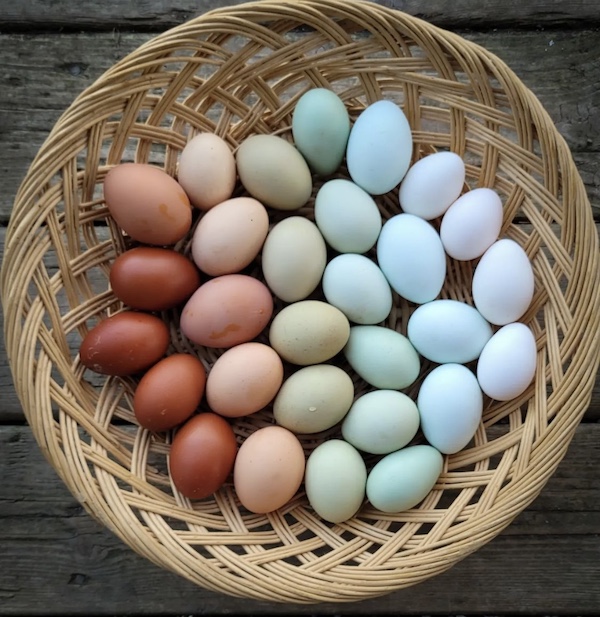
3. Does the color of an egg affect the taste? Are brown eggs the best?
Truth: Color doesn’t have any affect on the taste of the egg. Does chocolate milk come from a brown cow? Of course not. All eggs are the same on the inside, no matter what color they are on the outside. They are nutritionally equivalent.
4. Can an egg turn into a chicken?
Truth: The only way an egg can turn into a baby chick is if it is fertilized by a rooster. In order to hatch, eggs also need to be consistently kept at a very warm temperature and specific humidity level and turned regularly for 21 days. There is absolutely no way there would ever be a baby chick unless these very strict requirements were met.
5. Are egg yolks bad for you?
Truth: Egg yolks have more fat and cholesterol than egg whites, but this does not mean they are unequivocally bad for you. Some folks with health issues may want to refrain from eating them, but for most people they are fine. Talk to your doctor to find out if they are safe for you to eat.
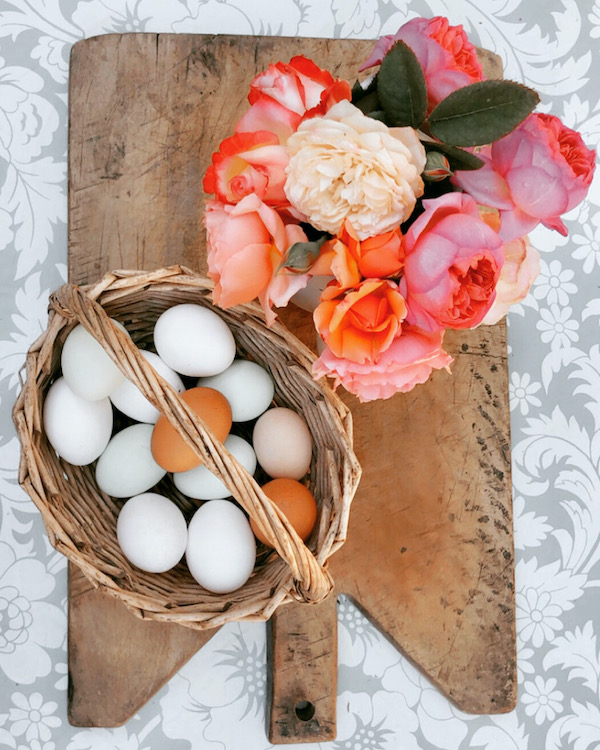
Thank you for visiting my blog. I hope I answered any questions you have about eggs. To learn more about the difference between store-bought vs. farm-fresh eggs see which is best?. You may also enjoy 5 Super Easy Ways to Use Up Eggs. Wishing you peace, love, happiness, and beautiful vistas!
-
5 Super Easy Ways to Use Up Eggs
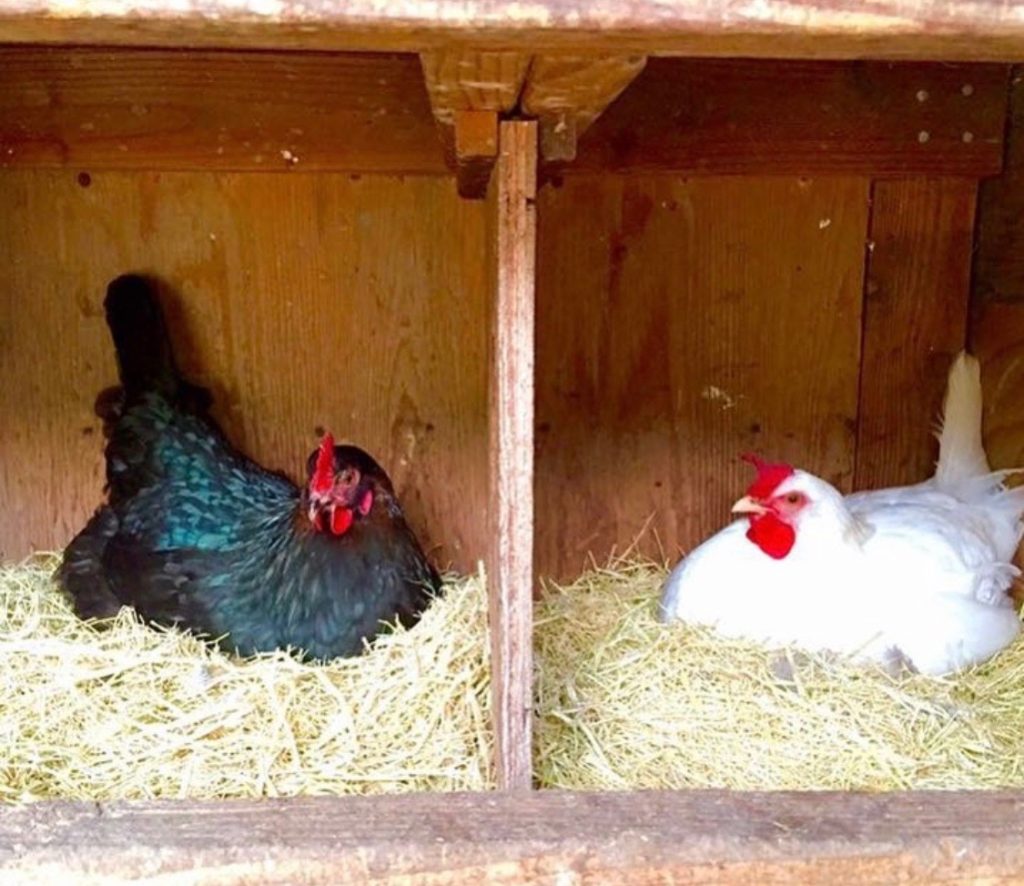
As all of us chicken parents know, summer is the height of egg production. Longer days with more sunlight start those hens a-laying. This can lead to having a big stockpile. Giving eggs to friends, family & neighbors helps, but what to do with the rest? Here are some easy tips for using up those extra summer eggs.
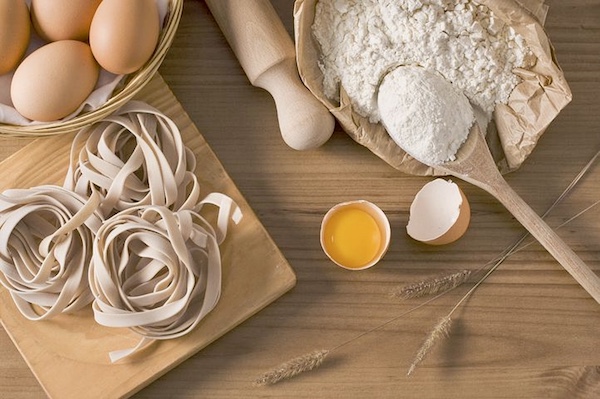
1. Recipes to Use Them UP!
Egg salad, potato salad, noodles, custards, French toast, lemon curd, quiche, and frittata are all dishes requiring lots of eggs. Deviled, fried, scrambled, or poached, there are endless possibilities.
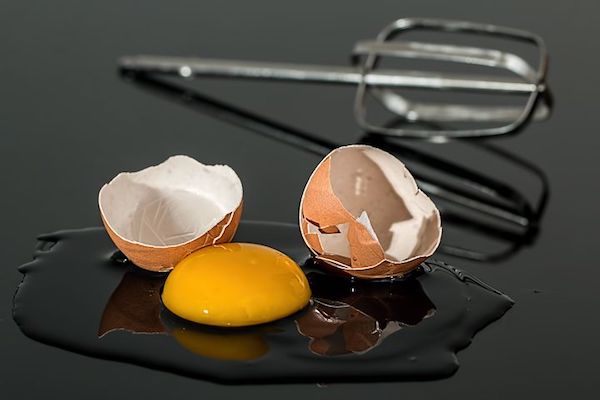
2. Freeze Without The Shell
You can’t freeze them in the shell, but you can freeze the insides. To freeze, crack yolks and whites into a bowl and mix briefly, then pour into ice cube trays. If you want to keep the whites and yolks separated you can do this too. Whites don’t need to be beaten, but yolks do and will require the addition of 1/2 tsp. salt OR 1 and 1/2 tsp. sugar for each cup of yolks, so decide if you will be using them for savory or sweet (and don’t forget to label which they are!) Once frozen, you can remove and place in a freezer appropriate storage container.
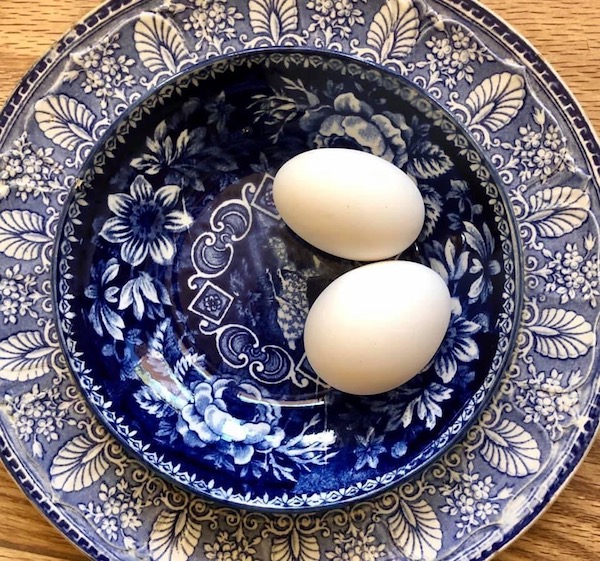
3. Freeze The Yolks
Freeze hard boiled yolks. You can’t freeze hard boiled whites or they will be rubbery and unappetizing. The easiest way to do this is to separate the white from the yolk, then drop the yolks in a pan of water so they are just covered. Bring the water to a boil, then remove the pan from heat and let stand 10-15 minutes. Drain the water and voila! The yolks are ready to freeze.
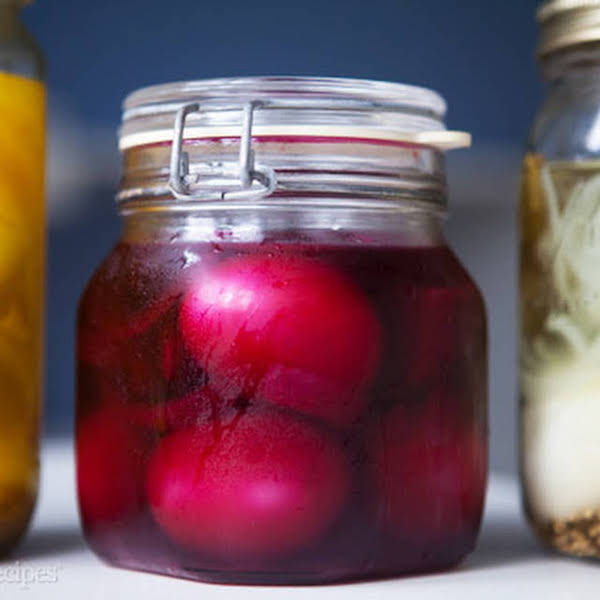
Source: Yummly 4. Pickle Them
Make pickled eggs. These are hard-boiled eggs cured in a brine. This was a technique used before refrigeration. My friend Jaclyn made some and brought them to work once for us to try, and they were delicious as well as super pretty. Here is a great recipe for pickled eggs.
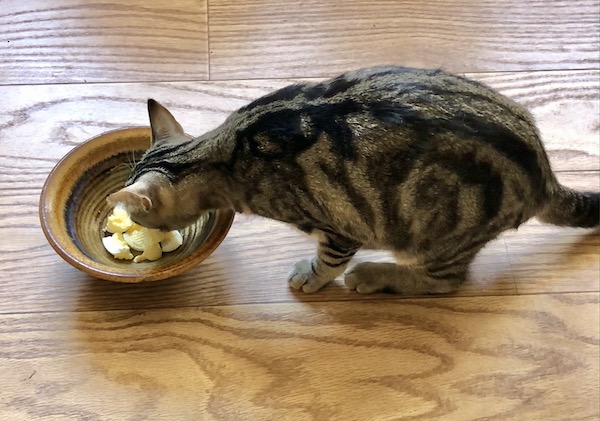
5. Give Them to Your Critters
Feed them to your pets! Cooked eggs can be fed to your dog, chickens, cats, etc. Eggs are an excellent source of protein, calcium, iron, B vitamins and amino acids. Never give raw eggs to animals due to risk for bacterial poisoning. Feeding raw could also interfere with absorption of vitamin B. Always check with your veterinarian prior to giving them to fur babies if you suspect allergies. My German Shepherd, cats and chickens love them!
Helpful Tips:
- Always label stored eggs so you know when you first stored or froze them. Include added ingredients, such as salt or sugar.
- You can freeze eggs for up to a year.
- Always thaw frozen eggs in the refrigerator; never attempt to cook them straight from the freezer.
- For recipes, 3 Tablespoons of thawed raw egg = 1 egg.
- Never go into the chicken coop barefoot!
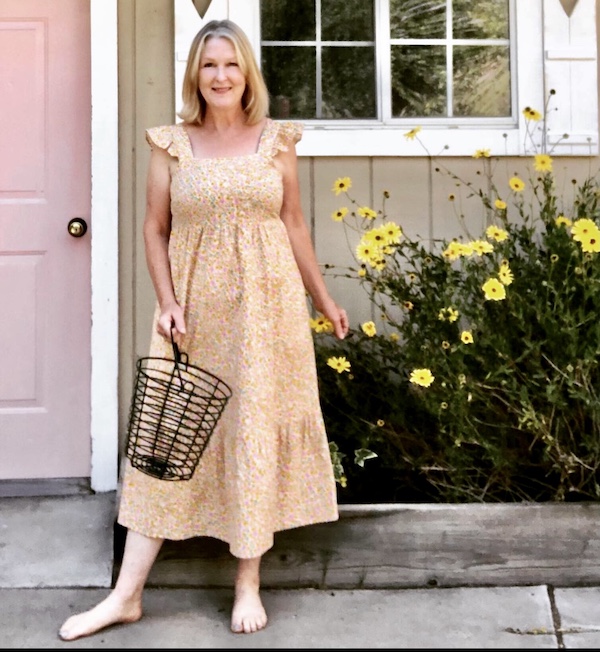
Thank you for visiting my blog! You may also like Rare Chicken Breeds and Common Chicken Sayings. Wishing you peace, love, happiness, & beautiful vistas.
-
Fairy Eggs! Tiny Surprises from your Chickens
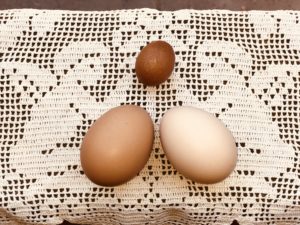 Fairy eggs, also called “wind”, “witch”, “cock” or “fart” eggs, are much smaller than regular eggs and usually contain no yolk. They are the result of a common glitch in the laying process. Fairy eggs often occur very early in a hen’s productive life before her hormones and reproductive cycle are working properly. Sometimes, however, they may occur very late in a hen’s laying life as her hormone production is winding down. They can also be the result of stress, a new diet, new flockmates, environmental changes, or a disruption of routine.Fairy eggs come in all the colors that hens lay: white, brown, green, blue, pink, and beige. Sometimes they may be lighter or darker than regular eggs since they may spend more or less time in the hen’s shell gland pouch. This deposits pigments in the final stage of egg making. Fairy eggs are nothing to be concerned about and are fine for humans to eat.
Fairy eggs, also called “wind”, “witch”, “cock” or “fart” eggs, are much smaller than regular eggs and usually contain no yolk. They are the result of a common glitch in the laying process. Fairy eggs often occur very early in a hen’s productive life before her hormones and reproductive cycle are working properly. Sometimes, however, they may occur very late in a hen’s laying life as her hormone production is winding down. They can also be the result of stress, a new diet, new flockmates, environmental changes, or a disruption of routine.Fairy eggs come in all the colors that hens lay: white, brown, green, blue, pink, and beige. Sometimes they may be lighter or darker than regular eggs since they may spend more or less time in the hen’s shell gland pouch. This deposits pigments in the final stage of egg making. Fairy eggs are nothing to be concerned about and are fine for humans to eat.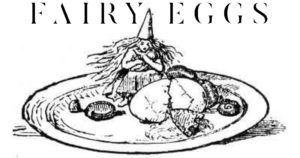 While I find the nickname “fairy eggs” to be quite endearing, these miniature eggs have had several names through the ages. In the Middle Ages, they were called “cock” eggs, since, without a yolk, the egg wasn’t viable, and was believed to be laid by roosters. They were also referred to as “witch” eggs, which were believed to be the work of the devil. According to superstition, to protect against the evils of a cock egg, one should throw it over the roof of the family house and let it smash on the ground on the other side. In Scotland and other European countries, the eggs are referred to as “wind” eggs. More recently in the US, they have been labeled with the indelicate moniker “fart” eggs.Sometimes, we need to believe in fairy tales. And fairy eggs. It’s the little things in life, after all!
While I find the nickname “fairy eggs” to be quite endearing, these miniature eggs have had several names through the ages. In the Middle Ages, they were called “cock” eggs, since, without a yolk, the egg wasn’t viable, and was believed to be laid by roosters. They were also referred to as “witch” eggs, which were believed to be the work of the devil. According to superstition, to protect against the evils of a cock egg, one should throw it over the roof of the family house and let it smash on the ground on the other side. In Scotland and other European countries, the eggs are referred to as “wind” eggs. More recently in the US, they have been labeled with the indelicate moniker “fart” eggs.Sometimes, we need to believe in fairy tales. And fairy eggs. It’s the little things in life, after all! -
Common Chicken Sayings
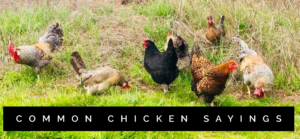
It is amazing to me that so many everyday sayings refer to chickens. The following is a list of phrases referencing chickens.
Be chicken- to be afraid
Nest egg – to save a little money each week
Scratching out a living – to earn enough to get by on
Don’t count your chickens before they hatch – don’t plan on something before it actually happens.
Don’t put all your eggs in one basket – don’t plan on an outcome before it actually happens.
Chicken feed – small amount of money
Feather your nest – saving for the future
Hen house – large number of females living in the same house
Mother hen – very protective
Madder than a wet hen – very angry
Fussing like an old hen – angry
Scarce as hen’s teeth – extremely hard to find
Chick – a woman
Hen-pecked – nagged
The rooster may crow but the hen delivers the eggs
Rooster games – willing to fight instead of trying to work out a problem
Flew the coop – gone
Up with the chickens – waking early with the sunrise
Walking on eggshells- treading softly where certain people are concerned; trying not to upset someone
Like a chicken with it’s head cut off – running around with no direction
Shake a tail feather – get moving
Strutting’ your stuff – Showing off
Bird brain – senseless
Dumb cluck – senseless
Ruffle your feathers – something annoys you
Chicken hearted – Not brave
No spring chicken – An old person
Hatch an idea – put a plan into motion
Egg on your face – caught in an untruth
Rule the Roost – to be the boss
Pecking order – hierarchy, your rank
Play Chicken – a stand off, who will give first
Brood over it – to worry over a problem
Chicken scratch – poor handwriting
Bad egg – less than honest person; poor moral standards
You have to break eggs to make an omelet – sometimes you need to make a mess to get something done
It’s not what it’s cracked up to be – disillusionment
I hope you enjoyed this! Happy Tuesday!